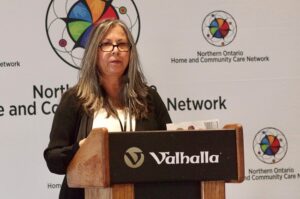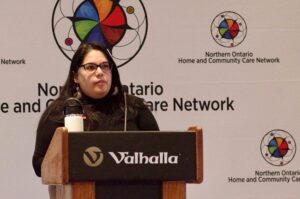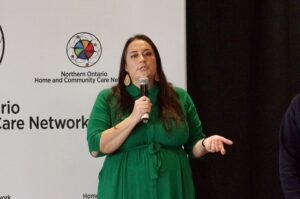Northern Ontario Home and Community Care Network hosts its 4th annual gathering

By Rick Garrick
THUNDER BAY — The Northern Ontario Home and Community Care Network’s (NOHCCN) 4th Annual Gathering, Our Home Care Successes, included presentations by Anishinabek Nation citizens Priscilla Sky, Karen Pitawanakwat, Dr. Alexa Lesperance, and Miranda Lesperance held Feb. 13-15 at the Valhalla Hotel and Conference Centre in Thunder Bay.
Sky, nurse advisor at Indigenous Services Canada and Long Lake #58 citizen, says her Service Delivery Plan Workshop was about home and community care service delivery plans.
“They get to decide how they run their program and I’m there just to provide the support for that,” Sky says, noting that the service delivery plans are supposed to be updated on a yearly basis. “However, they have been kind of pushed to the wayside because of COVID-19, because of lots of external factors. So now, we are trying to get everybody caught up again on their service delivery plans because they need to be changed.”
Sky says a revised service delivery plan is needed when there are proposed changes.
“Whenever there is a change to your home and community care program, we need to kind of know about it,” Sky says. “And that means you have to update your service delivery plan, include it in there, and then submit it to us. So that can include a restructuring to your staff mix, budget reallocation, types of services being provided, and the types of caregivers.”
Pitawanakwat, senior community based researcher at Naandwechige-Gamig Wikwemikong Health Centre partnered with University of Minnesota and Wiikwemkoong citizen, delivered two presentations on Addressing the Need for Culturally Appropriate Dementia Specific Practice Tools to Use With Indigenous Populations in Canada and PIECES of My Relationships.
“I talked about the Canadian Indigenous Cognitive Assessment Tool that was adapted from the Kimberley Indigenous Cognitive Assessment in Australia,” Pitawanakwat says about her first presentation. “That one we adapted with the Anishinabek language expert group here on Manitoulin and we had an expert panel look at it as well.”
Pitawanakwat says PIECES of My Relationships was adapted from a tool that Behavioural Supports Ontario uses, PIECES of My Personhood.
“We just made it fit for how we would ask our Elders those questions about themselves,” Pitawanakwat says. “We also had to develop a family supplement because of our teaching around humility, being humble. We wouldn’t expect an Elder to answer questions about themselves, like being boastful about things they’ve done in their life and that sort of thing, but their family would be more than equipped to share what those would be for that loved one.”

Alexa, a physician who grew up in Biinjitiwaabik Zaaging Anishinaabek and now provides locum medical care services at different Indigenous organizations, says her Addressing Anti-Indigenous Racism presentation was about how health care institutions discriminate against Indigenous people and ways to address that.
“Today, I talked about a case-based example of a situation where multiple times a patient had experienced poor treatment within health care and just understanding his case and what brought him to that situation,” Alexa says. “I think it’s important in terms of actions to make sure that when you’re assessing a patient it’s a blank slate, you’re taking into consideration what someone has said before but you’re also making your own assessments. The way we chart needs to include neutral language so instead of labelling someone as violent or aggressive, just objectively talk about what it is we’re labelling as violent and aggressive because too often that label gets put on our people, especially our Indigenous men and it’s not accurate.”
Alexa says what stood out to some of the community members in attendance was that lots of people in their 60s are going to long-term care homes because that is the only place they can get support.
“So we need more supports on-reserve, home care supports, and our own long-term care centres for Indigenous people,” Alexa says.
Miranda, vice president of Indigenous Collaboration, Equity and Inclusion at the Thunder Bay Regional Health Sciences Centre and Red Rock Indian Band citizen, says she spoke about the Indigenous health services available at the Thunder Bay Regional Health Sciences Centre during her Indigenous Collaboration Equity and Inclusion presentation.

“Mainly, I presented with the Indigenous care coordinators to talk about what their role is at the hospital, which is to help advocate and connect Indigenous patients to services within the hospital but also in the greater community at large,” Miranda says. “The most significant change I imagine is the creation of a portfolio, the Indigenous Collaboration, Equity and Inclusion. The Indigenous care coordinators and the Indigenous patient navigators, they’ve been at the hospital for a few years now but now we’re formally under the Strategic Plan and under the EDI (Equity, Diversity and Inclusion) pillar.”
The gathering also featured opening comments by Michelle Kakegamic, president at NOHCCN, a dignitary address by Nishnawbe Aski Nation Grand Chief Alvin Fiddler, a variety of concurrent workshops as well as presentations by Sandy Lake’s Nancy Fiddler and Joan Rae, Dennis Windego, and Heather Andy, and an AGM and Gala.


